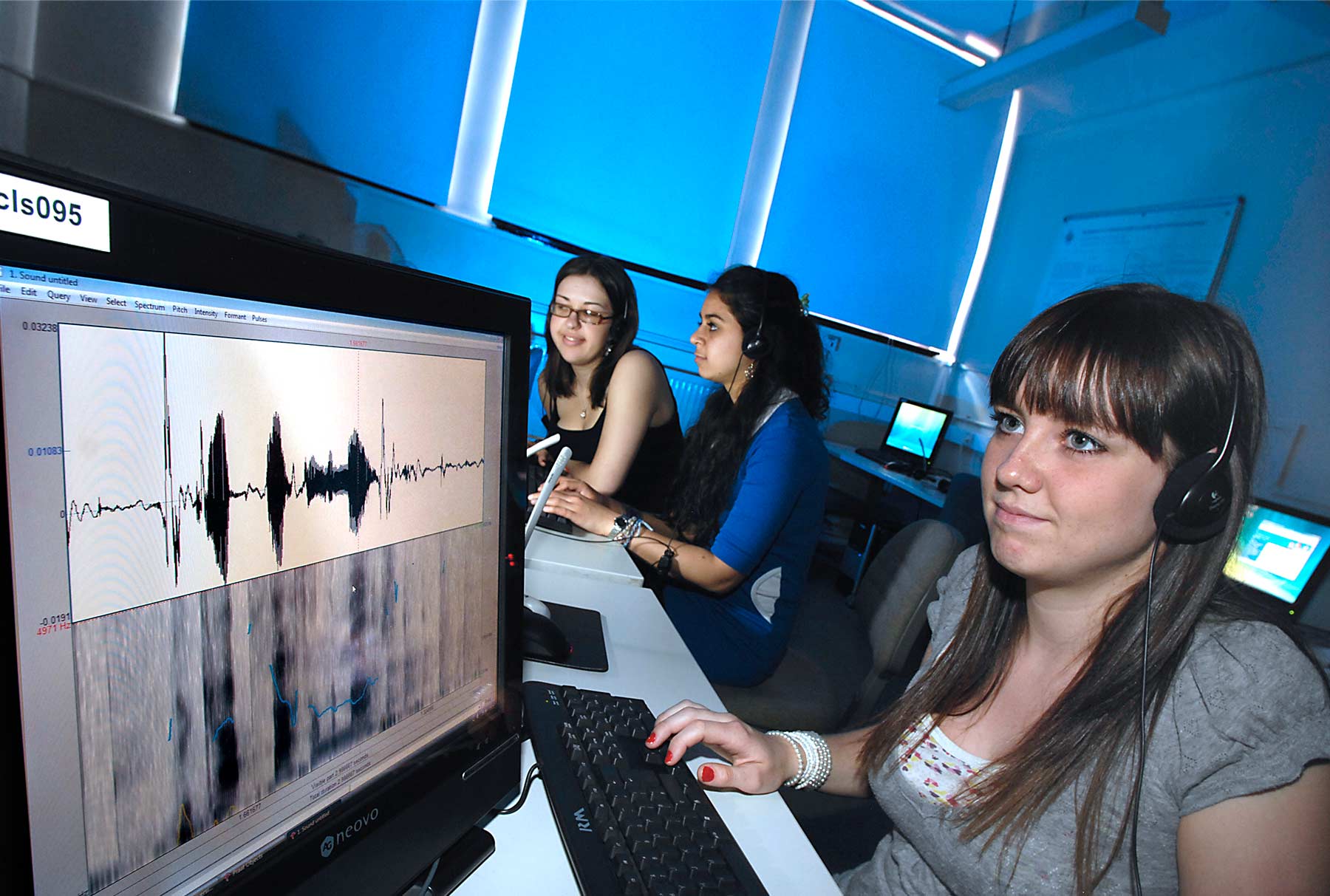Phonetics and Phonology
We are interested in and have expertise in experimental phonetics, adult and child phonology, socio-phonetics and multilingualism.
We are a varied group of researchers interested in all aspects of speech production, perception and learning. We are part of the Humanities and Social Sciences Faculty Research Groups and our members belong to:
- School of Education, Communication and Language Sciences
- School of English Literature, Language and Linguistics
- School of Modern Languages
- Neuroscience Unit of Biological Sciences (Faculty of Medical Sciences)
The discipline of phonetics and phonology is evolving rapidly. This is due to theoretical advances in conceptualising how we represent speech. Technological advances in measuring and analysing speech also play a part.
Our researchers are working at the forefront of these advances. They adopt inter-disciplinary approaches to studying:
- speech processing
- phonological development
- language variation and change
The outcome is a laboratory approach to phonology. It scrutinises the traditional division between phonetics and phonology.
Our themes
Arabic Phonetics and Phonology
Our members have been addressing major gaps in the Phonetics and Phonology of various Arabic dialects. They use instrumental and articulatory techniques. We have covered areas which include:
- gemination
- nasalisation
- pharyngeal and guttural realisation and representation
- static and dynamic aspects of vowel production
- voicing/laryngeal contrasts
- Bilingual and second language phonology
Bilingual and second language phonology
We research the acquisition of phonetics and phonology by monolingual and bilingual children. We put particular emphasis on the influence of the social context in which acquisition takes place.
We have also explored second language acquisition of various phonetic and phonological features. We also look at Arabic and German too.
An area we contribute to is the influence of orthography on second language phonological representation. This is an understudied area of research that has recently attracted a lot of attention.
Prosody
We have excellent expertise in speech rhythm and its role in the perception and production of speech. We look at:
- areas of acquisition
- word segmentation
- communicative function
- timing
We use state-of-the-art techniques to investigate representations of rhythm, intonation and emotion in the brain.
Sociolinguistics and Language Variation and Change
Our research areas include:
- dialectology
- language place and identity
- sociolinguistic factors
They influence variation in speech and people’s perception of it. We have looked at dialectal variation in various dialects of Arabic, French and English.
We also look at the acquisition of socio-phonetic variation, and the perception of native and non-native accents and dialects.
Representative publications
Almurashi W, Al-Tamimi J, Khattab G. Static and dynamic cues in vowel production in Hijazi Arabic. Journal of the Acoustical Society of America 2020, 147(4), 2917-2927.
Al-Gamdi N, Al-Tamimi J, Khattab G. The acoustic properties of laryngeal contrast in Najdi Arabic initial stops. In: 19th International Congress of Phonetic Sciences ICPhS 2019. 2019, Melbourne, Australia: Canberra, Australia: Australasian Speech Science and Technology Association Inc.
Al-Tamimi J, Khattab G. Acoustic correlates of the voicing contrast in Lebanese Arabic singleton and geminate stops. Journal of Phonetics 2018, 71, 306-325.
Khattab G, Al-Tamimi J, Alsiraih W. Nasalisation in the production of Iraqi Arabic pharyngeals. Phonetica 2018, 75(4), 310-348.
Heyne M, Derrick D, Al-Tamimi J. Native language influence on brass instrument performance: An application of generalized additive mixed models (GAMMs) to midsagittal ultrasound images of the tongue. Frontiers in Psychology 2019, 10, 2597.
Griffiths TD, Alter K, Shinn-Cunningham B. Speech Biomechanics: Shaping new sounds. eLife 2020, 9, e55749.
Nimz K, Khattab G. On the role of orthography in L2 vowel production: The case of Polish learners of German. Second Language Research 2019, 36(4), 623-652.
Palmer, S.D., Hutson, J., White, L., & Mattys, S.L. (2019). Lexical knowledge boosts statistically-driven speech segmentation. Journal of Experimental Psychology: Learning, Memory and Cognition, 45(1), 139-146.
Sedley W, Alter K, Gander P, Berger J, Griffiths T. Exposing pathological sensory predictions in tinnitus using auditory intensity deviant evoked responses. Journal of Neuroscience 2019, 39(50), 10096-10103.
White L, Benavides-Varela S, Mády K. Are initial-consonant lengthening and final-vowel lengthening both universal word segmentation cues? Journal of Phonetics 2020, 81, 100982.
Phonetics and Phonology group members
Aside from the departments listed above, our research group also includes Associate Members from the Humanities and the Computer and Information Sciences departments at Northumbria University.
Staff with the School of Education, Communication and Language Sciences:
- Lauren Ackerman
- Jalal Al-Tamimi
- Ghada Khattab
- Christos Salis
- Laurence White
Members of other Schools in the University:
- Kai Alter
- Dan Duncan
- Damien Hall
- Hannah Leach
- Sophie Meekings
- Gary Taylor-Raebal
- Rory Turnbull
